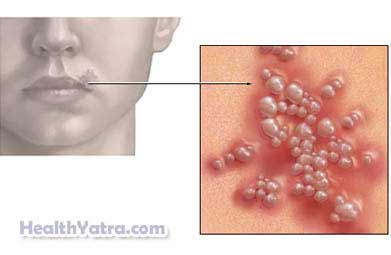Definition
Cold sores are small, painful, fluid-filled blisters. They are usually found at the border of the lip.
Cold sores will go away on their own within two weeks. Medications may help relieve symptoms or shorten the length of time you have them.

Causes
Cold sores are caused by two types of herpes simplex viruses. Cold sores are very common. In most cases, people contract the virus as young children.
You may get the virus from:
- Contact with the fluid from a cold sore of another person, or genital herpes sores
- Contact with the eating utensils, razors, towels, or other personal items of a person with active cold sores
- Sharing food or drink with a person with active cold sores
- Contact with the saliva of a person who has the herpes virus even if no sores are present
The first episode of illness with herpes virus can cause a body-wide illness. After that, the virus lies quietly in the skin until it is reactivated. The reactivated virus causes a cold sore to appear.
Risk Factors
Factors that can reactivate the virus and lead to an outbreak of cold sores include:
- Infection, fever, cold, or other illness
- Exposure to sun
- Physical or emotional stress
- Certain drugs
- Weakened immune system
- Menstruation
- Physical injury or trauma
- Dental or other oral surgery
It is not always clear what triggers a cold sore.
Symptoms
A cold sore occurs most often on the lips, but can occur in the mouth or other areas of the skin. They are small painful sores that are fluid filled and red-rimmed blisters.
You may notice some itching, tingling, or burning the day before a cold sore appears. The sores will dry up with a crust and shallow sore after a few days.
Diagnosis
The doctor will ask about your symptoms and medical history. The blisters will be examined.
The doctor can usually diagnose a cold sore by looking at it. In rare cases, a sample of the blister may be taken. The sample will be sent to a lab to be analyzed.
A blood sample may also be taken for testing.
Treatment
Cold sores will usually heal within two weeks even without treatment. However, certain treatments may help decrease symptoms. They may also shorten the time that you have a sore. Treatment options include:
To help reduce pain consider:
- Nonprescription cold sore cremes and ointments
- Place ice on the blisters
- Rinse with mouthwash containing lidocaine
Prescription antiviral creams or ointments, may also help decrease pain.
Your doctor may prescribe oral antiviral medications to suppress frequent outbreaks. These are taken the moment you feel a cold sore coming.
Avoid rubbing or scratching blisters. This can delay healing and cause an infection.
If you have an active cold sore, avoid touching the infected area. This will help keep you from spreading the virus to other people and/or other parts of your body. If you do touch the area, wash your hands.
Prevention
To reduce your chance of catching a virus, take these steps:
- Be careful around people who have active cold sores. Avoid skin contact and kissing. Do not share food, drink, or personal items.
- Avoid performing oral sex on a person with genital herpes. The virus spreads more easily when active sores are present.
The herpes virus will never leave your body once you have it. There is no cure for the infection. If you already have a herpes infection, to prevent future outbreaks of cold sores or blisters:
- Avoid long periods of time in the sun.
- Use sun block on lips and face when in the sun.
- Get adequate rest and relaxation. Try to minimize stress.
- If you have outbreaks often, talk to your doctor about taking antiviral medicines.
